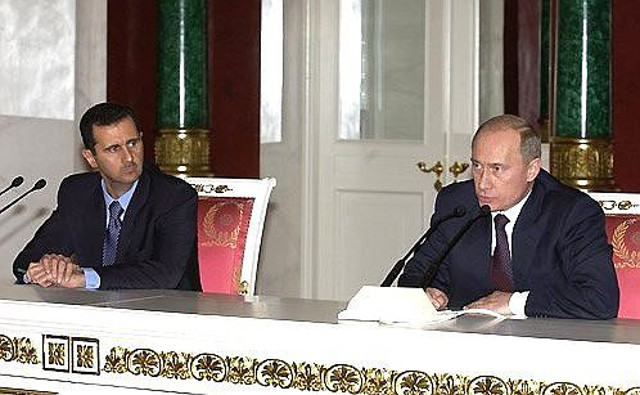by Henry Precht
The roots of US involvement in the Syrian war run deep and wide. On our side we can start with the Korean conflict, which ended in a tie and a lesson taught: never fight a land war in Asia. Unfortunately, the lesson wasn’t learned because about a decade later we were subbing for the French in Vietnam. From that losing fight we should have learned, but didn’t, not to take the corrupt, unpopular side in an internal conflict.
After messing about with several proxy wars on various continents, we re-entered the big time with wrong-headed wars to remake Afghanistan and Iraq according to our designs. We succeeded in bringing home casualties in the tens of thousands, while inflicting billions of dollars in damage on those societies and on our own economy. The lesson we learned came in two equally misguided parts: (1) Every problem has a solution, most often a military one, and (2) It is the responsibility of America’s world leadership to find that solution.
Syria is, like its neighbors, a mélange of religions and ethnic groups competing for scarce resources, rendered ever more scarce by global warming. Syria struggled to make its independent way after the Ottoman Empire collapsed and the French moved in followed by a long, post-World War II series of coups. Finally, Hafez al-Assad gained power in 1970 with Soviet help. The Assads are Alawites, a small sect that now provides many of the regime’s senior politicians. Their rule is secular, affording protection to the majority Sunnis, and minority Druze, Shia, Christians, and a few Jews.
During the so-called Arab Spring, a Sunni-led provincial rebellion sought to follow Tunisia, Egypt, and other Arabs in hauling down Syria’s rulers. Assad was no pushover, however, and responded forcefully, whereupon a Sunni alliance of Saudi Arabia, other Persian Gulf money, and Turkey moved forward to support the largely Islamist opposition. Filling in on the other side of the battle lines, Iran and its allied Shia fighters in Hezbollah came to the aid of the regime. Critical support for the regime also came from Russia. The US ineptly and so far unsuccessfully tried to help the “moderate” opposition. The Obama administration made a desperate effort with the Russians to find a political solution and put an end to the violence that has taken over 200,000 lives and rendered over 11 million Syrians homeless.
Then came the Trump administration and its confusing ups and downs in relations with Moscow. The lowest point was reached when the US accused the Assad regime—possibly, Washington said, with the connivance of Moscow—in a gas attack on an opposition-held region. Russia vigorously denies any responsibility, as does Assad.
There’s neither independent evidence nor rational motivation for the attack. I agree with the Syrians and Russians. Having re-captured Aleppo they were en route to victory. Why would they seek notoriety in the world when final success was imminent? Only the rebels have benefited from the employment of that gas. Plus, of course, the Trump bunch has a reputation for falsehoods and a sharply felt need to shift the spotlight away from its much-criticized connection with Putin and his spies during the November elections.
Chances are that a bloody stalemate in this war will persist for some time, just as it did in Lebanon. With luck and a concerted effort from all the combatants against the Islamic State, the terror caliphate could end its imperial ambitions in Syria and also Iraq, following al-Qaeda into fragmentation and locally directed acts of individual terrorists. That’s not a pleasing prospect, but an improvement over a territorial terrorist state.
Here are two lessons that the Trump folk might wisely take to heart.
The administration should recognize that Russia has a role to play restoring a measure of stability (if not democracy and freedom) in Syria. While holding our national nose, we should cooperate with Moscow pragmatically and without vitriol to that end.
The administration should also recognize that the Assad regime is just that—a structure of institutions, a functioning economy, and a sense of community. In other words, it’s a government that can block the advance of a terrorist state. That is the outcome we should most ardently seek to avoid.
Photo: Syrian President Bashar al-Assad and Russian President Vladimir Putin






Thank you for the excellent assessment of Syria. Trump is a follower since he doesn’t have a policy of his own about anything! The lessons NOT learned by the US specifically about the ME/NA go back all the way to Reagan & Rumsfeld’s time in 1980 when they encouraged and Armed Saddam to attack Iran. Then Bush senior, Clinton, GWB, by the way being the worst for smoking out the Mujahedings as he said it himself and finally Obama! And now the UN-intellectual Trump is following their footstep (purpose and intent) which has been and still is two folds:
1. Hoarding of regional resources (oil) only for themselves and keeping the competitives such as China out of these regions
2. Protecting state? of Israel